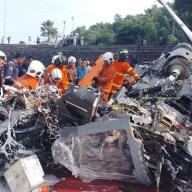Metro spoke with Thomas Cargill, assistant head of the Africa program at Chatham House, a
London-based think tank.
What makes this crisis different from those we heard about before?
The famine was caused, of course, by a shortage of rain, but mainly it’s due to the Somali political landscape: Large parts of the country are governed by local warlords and extremist groups preventing food aid from arriving to the population. On top of it, some countries, like the U.S., have been accused of preventing food delivery to the population for fear that that this would help radical groups. The U.S. has been cautious about the issue so far. So the problem is not just about food availability but also about getting the little food available to the right people in need.
Is the situation better in Mogadishu, the capital controlled by UN-backed Transitional Federal Government?
It is marginally better, even though the government is struggling to get the country together. The Islamist Al-Shahab insurgents do not recognize the TFG’s authority. In the areas controlled by Al-Shahab, the situation is much worse now. Western countries are giving some funding in terms of security, but Western countries are not popular at all in Somalia: They have to be very cautious in the way and the extent of their intervention. Western countries have to think about a new way to resolve this situation.
How can we help from here?
For now, the best way to help is to support NGOs; but in the long term, people should start asking their own Western government to push for a concrete political solution for Somalia. Somali people need help to be able to work out the best governance option on their own. The West has been too busy intervening in other parts of the world so far to dedicate enough attention to Somalia.

















